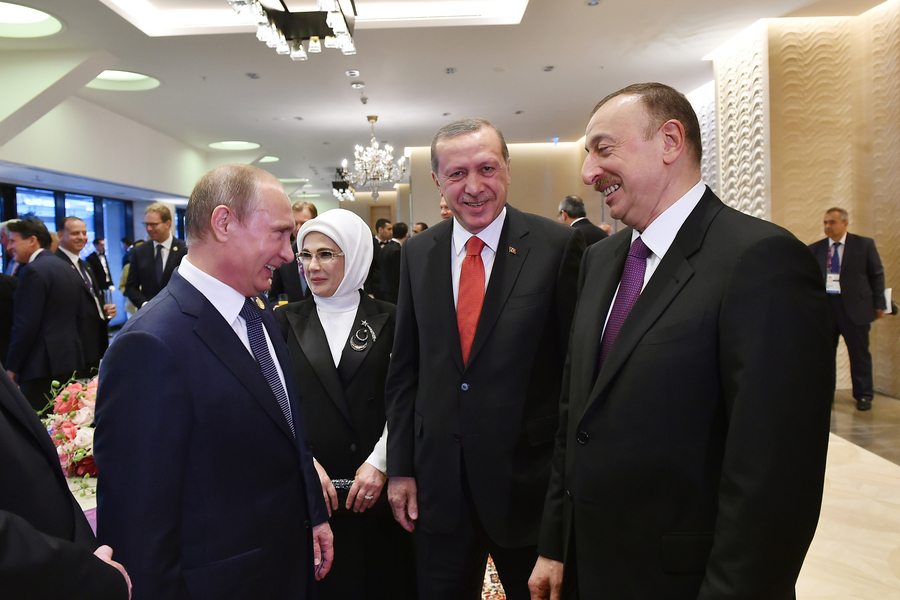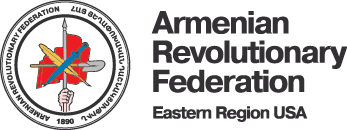Boyajian: Is Russia Really Armenia’s Ally?

Azerbaijan’s recent military attacks on the Nagorno-Karabagh Republic (NKR/Artsakh) and Armenia call into serious question the Armenian-Russian defense pact and relationship.

(L-R) Putin, Erdogan, and Aliyev at the European Games in Baku in June 2015. (Photo: Azerbaijani Presidential Press Service)
Russia has been selling Azerbaijan billions in advanced weapons that Azerbaijan is using against Armenians.
Russia has repeatedly failed to rebuke Azerbaijan for breaking the ceasefire that it agreed to two decades ago.
Russia has done nothing substantive to stop Azerbaijan’s frequent shelling of towns within Armenia itself.
In 2013, Col. Andrey Ruzinsky, commander of Russia′s 102nd military base in Armenia, said that Russia “may” not permit Azerbaijan “to restore jurisdiction over Nagorno-Karabagh by force.” Russia has yet to take any such actions.
Indeed, Russia may not care whether Azerbaijan overruns Artsakh as that, by itself, would not create a Turkish-Azeri corridor across Armenia that would threaten Russia’s position in the Caucasus.
What would Russia do if Azeri soldiers advanced into Armenia and swam in Lake Sevan? We don’t know.
More Armenian Reaction Needed
To their credit, Armenia’s top leaders and some MPs have expressed dismay to Russia. As of this writing, however, Armenian citizens and diasporan organizations have been virtually silent about Russian duplicity. Twelve days after the initial Azeri assaults, there has been but one demonstration at the Russian Embassy in Yerevan. This is incomprehensible. Though Armenians do care deeply, the Kremlin may be concluding the exact opposite.
Armenians often express appreciation for and solidarity with Russia. Similar sentiments, however, are seldom returned by Russians. The popular, flashy Russian TV network, RT.com, staffed by Western and Russian journalists, rarely reports anything—especially anything positive—about Armenians. These should be warning signs to Armenians.
Some Russians and Armenians argue that their defense treaty is only with Armenia, not Artsakh. Yet Russia has not countered Azeri attacks even on Armenia itself. Does the defense pact exempt Russia from acting against Azeri attacks? We don’t know. And the belief is widespread that Russia is secretly making deals with Azerbaijan at Armenians’ expense.
True, Armenia must be extremely careful because it is highly dependent upon Russian natural gas, the Russian-controlled Metsamor nuclear power plant, advanced weapons, Russian-manned bases near the Armenian-Turkish border, and more. Yet without Armenia, Russia would ultimately be surrounded, and perhaps even destroyed, by NATO.
Armenia Goes NATO, Russia Goes Under
Georgia and Azerbaijan are hostile to Russia, have close relations with the U.S. and Europe, and wish to join NATO. Azerbaijan and NATO member Turkey already call themselves “one nation, two states.”
Suppose Armenia, voluntarily or otherwise, left the Russian orbit. Georgia, Azerbaijan, and Armenia would soon be sucked into the NATO alliance. Separating the Muslim north Caucasus from the Russian Federation would become a top NATO priority.
NATO would create a Baku-based navy in the gas and oil-rich Caspian Sea. Reaching across the Caspian, NATO would link up with Kazakhstan, Turkmenistan, Uzbekistan, and Kyrgyzstan. This is pan-Turkism under a NATO fig-leaf.
Virtually surrounded by NATO and China, Russia would be ripe for destruction. The Kremlin may not totally understand this.
Armenians know that Soviet Russia gifted Armenian territories to Turkey and Azerbaijan in the 1920’s. As Armenia once again perceives Russia as unreliable, it will naturally look elsewhere. The West has, however, historically always broken its promises to Armenians and ultimately favored Turkey. So while Armenia’s someday joining NATO might be dangerous and improbable, it’s not impossible. Russia can twist Armenia’s arm and support its adversaries only up to a point.
Russian Naïveté
Russian strategy is to ingratiate itself with Azerbaijan and pull it back into the Russian orbit. Throughout the past decade, Russia has tried the same misguided strategy with Turkey.
Predictably, the Russian–Turkish love affair crashed and burned last year when Turkey shot down a Russian jet over Syria. This, declared President Putin, was the “betrayal of a friend.” Putin’s belief that President Erdogan and Turkey were truly his “friends” is breathtakingly naïve. It tells us that the Kremlin is delusional about Turkey and, by extension, its Azeri kin.
The Putin-Lavrov-Aliyev ménage-à-trois will culminate in a similar disaster for Russia, but not before Armenia is damaged, perhaps fatally.
Some Kremlin circles have been influenced by Aleksandr Dugin’s Eurasia Movement, which espouses a grand union of Slavs/Russians and Turks.
No one, including me, is suggesting that Armenia separate itself from Russia at this time. It is impractical and unwise. But the current relationship lacks symmetry. The people of Armenia, Artsakh, and the Armenian Diaspora must not remain silent while Russia implicitly supports Azeri aggression.
Rebalancing Armenia-Russian Relations
Rebalancing Armenian-Russian relations must begin with large and continuing protests against Russian betrayals, similar to the pro-Artsakh demonstrations of the late 1980’s. Moscow will respect this. Moscow does not respect people who, while being kicked in the teeth by a “friend,” pretend that they’re being kissed on the lips.
Yerevan must take bigger steps towards economic and political independence from Moscow and a more evolved relationship with the West. The Armenian Diaspora could help Armenia and Artsakh immensely more if only Armenia’s leaders, including its lethargic “ambassadors,” saw diasporans as kindred spirits rather than as interlopers.
The West, too, must confess its own horrendous transgressions against Armenians. The leaders and citizens of Armenia and Artsakh must be blunt about the West’s past and present betrayals and sickening Turkophilism. Why no Armenian protests in front of Western embassies? Why the hesitation to speak the plain truth? Yet what is the West offering Armenia? Very little.
A more balanced path involves risks for Yerevan, but so does subservience to Moscow as recent events have shown.
The author is an Armenian-American freelance journalist. Many of his articles are archived at www.armeniapedia.org/wiki/David_B._Boyajian.
Source: Armenian Weekly Mid-West
